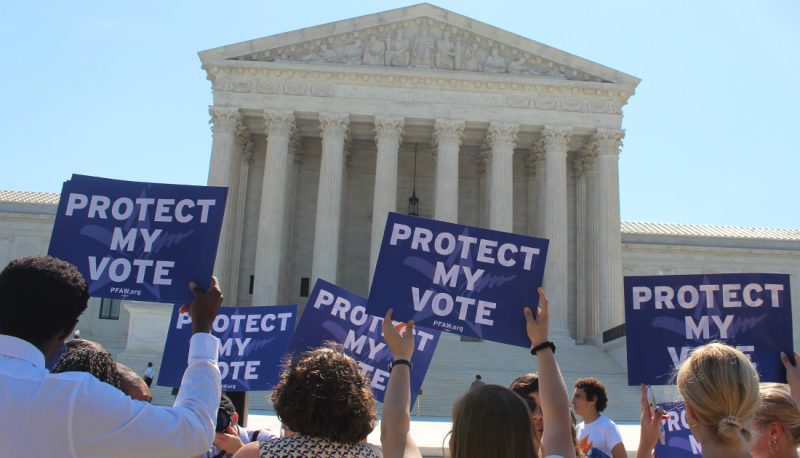Hearings on Judge Ketanji Brown Jackson, the first Black woman ever nominated to the Supreme Court, will begin next week. After she joins the Court later this year, it will continue to hear crucial cases that affect all of us. Voting rights will remain one of the most important issues that the Court will consider. It has already agreed to hear one critical voting rights lawsuit next term, and more likely will be added. A Justice Jackson will play a significant role in such cases.
What Dangers to Voting Rights Does the Current Supreme Court Pose?
The far-right 6-3 Court majority has already done serious damage to voting rights, particularly for Black Americans, other voters of color, and other historically disenfranchised communities. Last year, the majority devastated Section 2 of the Voting Rights Act (VRA) in approving restrictive voting practices that harmed minorities. This included a law that made it illegal for most people to collect and turn in absentee ballots. As Justice Kagan wrote in dissent, the ruling seriously “undermines” the law and the right to equal voting without discrimination.
This followed a very harmful voting rights decision a decade earlier. In that case, known as Shelby County, the majority eliminated the VRA mandate that jurisdictions with a history of discrimination needed to pre-clear voting changes with the Justice Department.
This year, the Court also voted 5-4 to allow Alabama to use a discriminatory redistricting map in this year’s elections. A lower court found that the map clearly discriminates against Black voters. That’s because it gives them less opportunity to elect candidates of their choice than their population suggests they should have. Perhaps even worse, the Court also agreed to consider a broader challenge to such voting rights cases in 2022-23.
What voting issues has the Court agreed to decide next year?
In a dangerous sequel to the Alabama ruling, the Court will decide next term the validity of the lower court decision striking down the state redistricting plan. Experts warn that this could result in a far-right ruling that produces a “radical reworking” of voting rights law. Specifically, the Court could totally preclude the use of the Voting Rights Act to challenge redistricting plans as racially discriminatory.
As Justice Kagan warned, such a ruling would “rewrite decades” of court precedent on minority voting rights. It could also significantly decrease racial diversity in Congress and state legislatures across the country.
What other voting rights issues could come before the Court?
Unfortunately, a lot. Many Republican states have enacted very restrictive voting laws, producing more lawsuits to help prevent voting discrimination. These lawsuits also seek to ensure that every voter in 2022 and beyond will have their ballot counted. As of March, 2022, the Brennan Center has tracked 60 such cases in lower courts around the country. One or more could well come before the Supreme Court after the new justice joins, possibly before the November elections.
For example, a Trump district judge in Arkansas recently dismissed a challenge to a state redistricting plan as discriminatory. For the first time ever, he ruled that private parties cannot file lawsuits at all under Section 2 of the VRA. As one columnist wrote, the decision “flies in the face of the history, purpose, and longtime interpretation” of the law. Yet far-right Justices Thomas and Gorsuch have already suggested that this devastating rewriting of the law may be correct. Depending on what happens in the lower courts, the Court could well take up this case.
Recently, the Court rejected state Republicans’ efforts to overturn state supreme court rulings that invalidated redistricting plans under state constitutions. North Carolina and Pennsylvania Republicans argued that the federal constitution prevents any interference with state legislatures’ election-related decisions. This would mean that state legislatures can violate their own state constitutions when they redistrict. But right-wing justices Gorsuch, Alito, and Thomas dissented, and Justice Kavanaugh noted that the issue was worth considering on the merits.
If the Court does take up such a case, it threatens to “embrace a radical theory rejecting state courts’ authority over election law.” As one analyst explained, the result could “overturn a century of pro-democracy precedent” and seriously harm voting rights.
What could a Justice Jackson do?
The far-right composition of the Court majority limits the impact of a new justice. Jackson would replace Justice Breyer, part of the three-justice minority that generally supports voting rights. It will take hard work by progressives over a number of years to change the Court, just as the Far Right did.
But as the late Justice Byron White reportedly stated , with each new justice, there’s a new Supreme Court. As Justice Sandra Day O’Connor explained, Justice Thurgood Marshall had an important influence on the Court by sharing his life experiences. The perspective of a Black woman justice may similarly make a difference in cases dealing with issues like voting rights. As Rev. Leslie Watson Wilson recently put it, “[a]ll American people will benefit when deliberations and decision-making on our highest court are sharpened by the perspective and persuasive power of a Black woman justice.”
That perspective will likely also sharpen dissents from far-right Court rulings. This will help promote reconsideration of such issues by Congress or the Court in the future. For example, a strong dissent by Justice Ginsburg helped lead Congress to change federal civil rights law and overcome a Court ruling that limited fair pay for women on the job. Congressional legislation, such as bills now before Congress, could repair at least some of the damage done by the Court to voting rights.
Replacing Justice Breyer with a Black woman justice will not immediately solve the problems posed by the far-right Supreme Court. In light of the crucial issues like voting rights that are at stake and concern all of us, however, it is an important first step.

